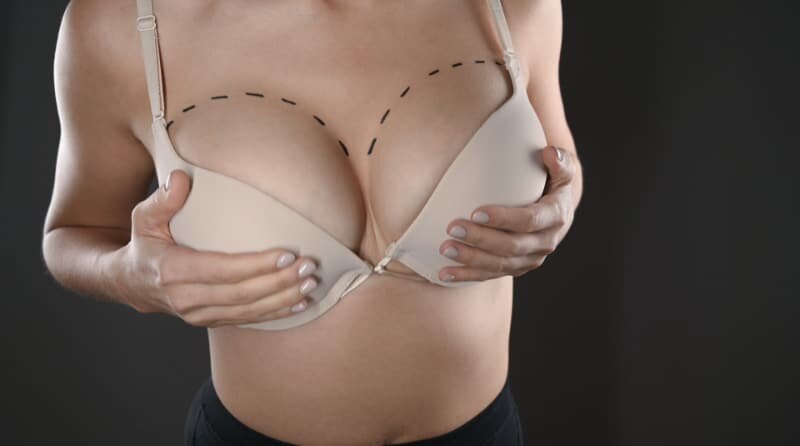Bloating after breast augmentation is a common complaint among patients. But don’t worry—it’s not permanent.
After a breast augmentation, it’s normal to experience some bloating in the chest area and swelling of the breast implants. This will go away within a few weeks after your surgery, but you can speed up the process by taking care of yourself post-op. Here are some things to keep in mind:
- Eat small meals every two hours instead of three big meals a day. Eating regularly will help keep your stomach from getting too full and swollen.
- Drink plenty of water; at least eight ounces per hour will help prevent water retention in your body, which can lead to bloating.
- Avoid alcohol and carbonated beverages for at least two weeks after surgery (or until your swelling has gone down). Both can contribute to bloating by increasing fluid retention in the body; alcohol also has anti-inflammatory properties that may slow down healing time and make scar tissue harder to deal with later on down the road!

Introduction
Breast augmentation is a procedure that many women choose to undergo in order to increase their breast size or to restore their breasts after a mastectomy. During the procedure, an incision is made either under the breast or in the armpit area for the plastic surgeon to place silicone or saline implants. For many people, this is an easy and relatively painless procedure. However, some side effects are common following surgery, including bloating. The good news is that this will only last for a short time and can be easily managed by getting plenty of rest and staying hydrated.
As the body adjusts to the changes from the procedure, swelling and bloating may be present.
- Swelling. As the body adjusts to the changes from the procedure, swelling and bloating may be present. This can range from mild to severe and can occur for several months following your surgery.
- Swelling after breast augmentation surgery is normal, as it happens with many types of procedures that require general anesthesia. The amount of swelling you experience depends on various factors, including:
- Your body’s overall health before surgery, including how young or old you are
- How much fatty tissue was removed during surgery
- Whether or not liposuction was performed during your procedure
After your breast augmentation, you may feel bloated because of your body’s response to anesthesia and surgery.
- You may feel bloated after your breast augmentation.
- Bloating is caused by the body’s response to anesthesia and surgery.
- It can last up to a week and can be treated with over-the-counter medications, such as Gas-X or Mylanta chewable tablets taken once every hour until your symptoms are gone.
This is completely normal to feel bloated after a breast augmentation, but how long it lasts depends on several things.
While it’s normal to feel bloated after a breast augmentation, how long it lasts depends on several factors including the type of procedure performed and anesthesia used. The most common causes of bloating are related to the amount of fluid put into your body during surgery. The more saline solution used during breast augmentation, the more likely you will experience swelling and swelling tends to lead to feeling puffy.
The time it takes for your breasts to settle will depend on several factors:
- The type of implant used (silicone vs saline)
- The size difference between your old breast tissue and new implants
The type of procedure done will affect how long you can expect this side effect to last.
The type of procedure done will affect how long you can expect this side effect to last. The type of implant used will also affect how long you can expect this side effect to last. The most common side effects, such as swelling and bruising, usually resolve within three months after surgery. A common complication is capsular contracture, which occurs when scar tissue tightens around your implants and causes them to become hard or misshapen. This complication usually resolves itself within nine months after surgery but may require further intervention if it does not go away on its own at that time. You should speak with your doctor if you experience any new or worsening symptoms after breast augmentation surgery so they can be evaluated accordingly

Your body needs time to recover from the trauma of surgery, as well as time for the anesthesia to clear from your system.
Your body needs time to recover from the trauma of surgery, as well as time for the anesthesia to clear from your system. This will take a few days and is normal. You may feel bloated or crampy during this time, but this is normal and should subside within a week or so. However long it lasts depends on the type of surgery done—some procedures require more recovery time than others. It’s also important to give your drains (if you had them placed) at least two weeks before you consider removing them yourself; otherwise, there’s a risk of infection developing in your incision site if any fluids are released prematurely into your body after draining has stopped.
An experienced plastic surgeon will be able to advise you when it will be okay to wear constraining clothing again.
Your doctor will advise you when it is safe to resume wearing constraining clothing, lifting heavy objects and driving. This will vary from patient to patient and depends on the type of procedure performed.
As with any surgery, there are some things you should avoid doing after your breast augmentation until given permission by your surgeon:
- Don’t drink alcohol or smoke cigarettes because these can slow healing or cause infection.
- Don’t use illicit drugs like cocaine or methamphetamines while recovering from breast surgery since they could increase bleeding or harm the healing process.
- Don’t wear constraining clothing until told it’s okay by your doctor (such as bras with underwires) as this can worsen swelling in the breasts. It’s important that patients follow their plastic surgeon’s post-operative instructions closely so they have a smooth recovery and minimal discomfort after surgery
It’s crucial that you follow all of your doctor’s post-operative instructions in order to prevent complications or infections from forming.
You should follow all of your doctor’s post-operative instructions in order to prevent complications or infections from forming. In general, they will advise you to avoid constraining clothing for a few weeks, strenuous activity for a few weeks, alcohol and smoking for at least one month after surgery (or until the stitches are removed), and caffeine for two weeks after surgery.
Your doctor may recommend taking over-the-counter medications for cramping or pain, but always consult with them before taking any medication following surgery.
You may be tempted to take over-the-counter medications for cramping or pain, but always consult with your doctor before taking them. If you do experience pain or discomfort after breast augmentation, your doctor can prescribe stronger medication that’s been specifically designed for postoperative use.
Your doctor may recommend taking over-the-counter medications for cramping or pain, but always consult with them before taking any medication following surgery.
Some other ways you can help lessen bloating after a breast augmentation include getting plenty of rest and eating healthy foods high in fiber.
After your breast augmentation surgery, you may experience some bloating. Other ways you can help lessen the amount of bloating include getting plenty of rest and eating healthy foods high in fiber.
- Don’t overeat. Overfilling your stomach will cause it to bloat and swell, which takes up space in your body that could be used for healing.
- Don’t drink too much alcohol. Alcohol has a negative effect on blood circulation, so drinking more than one drink per day could cause more bleeding than necessary when you’re recovering from surgery.
- Smoking cigarettes is also strongly discouraged while recovering from any type of cosmetic procedure because smoking reduces oxygen levels in the bloodstream and affects circulation, which can interfere with healing time after surgery—and make you feel worse by causing inflammation around an incision site (which can increase the risk for infection).
- Avoid lifting heavy objects like household furniture or bags full of groceries if possible until after recovery has finished; if lifting these items becomes necessary in order to get through daily tasks at home or work, try asking someone else who isn’t recovering from this type of surgical procedure to help out instead!
Pay close attention to your body while it recovers.
As your body recovers, pay close attention to how it’s feeling. If something hurts or doesn’t feel right, don’t do it. Let your doctor know if you have any concerns.
If things go well with recovery and healing, then try to gently get back into exercising or normal daily activities within a few weeks after surgery.
Conclusion
We hope this information has been helpful as you plan for your breast augmentation. It’s normal to feel bloated after surgery, but if it lasts too long or gets worse over time, always let your doctor know right away so they can make any necessary adjustments in your recovery plan.

